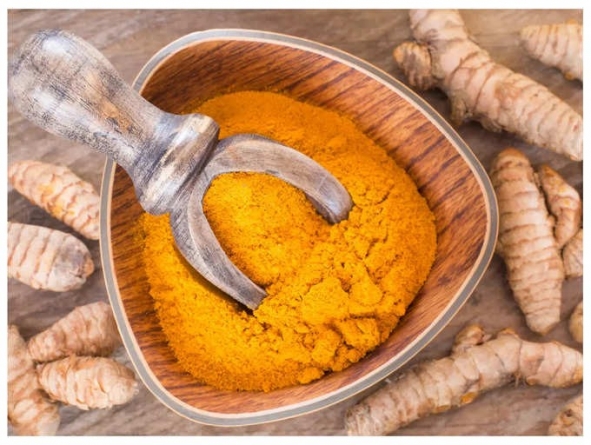-
WASHINGTON: India Now Second-Largest Source Country For New Citizens In US- Report - 1 day ago
-
LONDON: Indian-Origin Teen In UK Gets “Life-Changing” Cancer Treatment - April 25, 2024
-
SILICON VALLEY: All About Pavan Davuluri, New Head Of Microsoft Windows - April 25, 2024
-
LONDON: UK’s India Gate To Commemorate Role Of Indian Soldiers From World Wars - April 24, 2024
-
HARARE: Shri Bramha Kumar appointed as the next Ambassador of India to the Republic of Zimbabwe - April 23, 2024
-
LONDON: Indian-Origin Principal Wins UK Legal Challenge Over School Prayer Ban - April 23, 2024
-
TORONTO: Indian-Origin Doctor Needs ₹ 2 Crore For Legal Fees. Elon Musk Responds - April 22, 2024
-
KINSHASA: India-Democratic Republic of Congo Foreign Office Consultations - April 21, 2024
-
LONDON: UK Court Allows Sale Of Nirav Modi’s Luxury London Apartment - April 21, 2024
-
TEHRAN: Travel advisory for Iran and Israel - April 20, 2024
BANGKOK: Turmeric May Be as Good as OTC Drug Omeprazole for Treating Indigestion
BANGKOK: Turmeric may be as effective at treating indigestion as the over-the-counter drug Omeprazole.
A small study has found turmeric to be as effective as Omeprazole at treating indigestion.
- Participants experienced a significant reduction in symptom severity after taking turmeric supplements for 28 days.
- Curcumin, found in turmeric, has anti-inflammatory properties that reduce inflammation.
- Turmeric can be added to tea, stews, curries, or taken in supplement form
The culinary spice turmeric may be as effective as some medications for treating indigestion symptoms, according to the results of a small study.
New research has found that Curcumin, a natural compound found in turmeric, may be as effective as omeprazole— a drug used to curb excess stomach acid — at relieving indigestion in people diagnosed with functional dyspepsia–meaning other pathologies like ulcers or cancer have been excluded already
Researchers at Chulalongkorn University Faculty of Medicine, Bangkok, randomly assigned 151 patients aged 18-70 with recurrent stomach upset to one of three treatment groups for 28 days.
The first group had two large 250mg capsules of curcumin four times a day and one small dummy capsule. The second group took one 20mg capsule of omeprazole daily and two large placebo capsules four times a day. Finally, the third group was given turmeric plus omeprazole.
At the start of the study, participants in all three groups had similar clinical characteristics and indigestion scores, as assessed by the Severity of Dyspepsia Assessment score or SODA.
At the study’s end, SODA scores indicated significant reductions in symptom severity by day 28 for pain and other symptoms for those in the combined, curcumin alone, and omeprazole alone groups.
These improvements were even stronger after 56 days.
Though the researchers acknowledged the small study size and the short intervention period, they said: “The new findings from our study may justify considering curcumin in clinical practice.”
So, does this mean turmeric is a reliable alternative for proton pump inhibitor (PPI) drugs like Omeprazole? We asked two experts.
Turmeric and indigestion: what’s the link?
Sas Parsad, nutritionist and founder of The Gut Co isn’t surprised by the study results. “Turmeric has a long history of use in traditional medicine, particularly in Ayurveda, for its digestive benefits and role in nurturing a healthy gut,” he points out.
“Curcumin, the compound it contains has demonstrated anti-inflammatory and antioxidant properties, which may contribute to its effectiveness in alleviating indigestion symptoms and supporting gut well-being,” he explains.
Parsad says part of the reason turmeric is linked with indigestion relief is because of its ability to stimulate bile.
“Curcumin stimulates the gallbladder to release bile, which aids in the digestion of fats,” he explains. “Improved fat digestion can reduce symptoms like bloating and discomfort, further supporting gut comfort.”
Indigestion often involves inflammation of the stomach lining or other parts of the digestive tract. Parsad says the anti-inflammatory properties found in turmeric can counter this.
“Curcumin can help reduce this inflammation, which may alleviate discomfort and pain while promoting a healthier gut environment,” he notes.
On the other hand, conventional indigestion medications, like proton pump inhibitors (PPIs) such as Omeprazole, primarily work by reducing stomach acid production.
“While effective in many cases, long-term use of PPIs can have side effects, including potential impacts on gut health. In contrast, turmeric addresses indigestion through its anti-inflammatory properties and enhancement of digestive processes, contributing to a healthier gut,” Parsad surmises.
While the results of this study are promising, particularly for people who prefer to use natural remedies, registered nutritionist Anna Maspon says it’s important to note that the study has two big drawbacks.
“Firstly, this study didn’t have a control group of participants who either had no intervention or took only a placebo, therefore we don’t know the comparison to doing nothing, which is always an important consideration,” she explains.
“Secondly, there was no mention of diet, so while participants were randomized into groups, we have no idea what they ate, if diet differed between groups, how it might have changed, and if their diets were a factor in their improvement,” she adds.
Still, Parsad describes it as a “promising alternative” or “complementary approach” to indigestion treatment, especially for those looking to support a healthy gut naturally or experiencing side effects from medications.
























